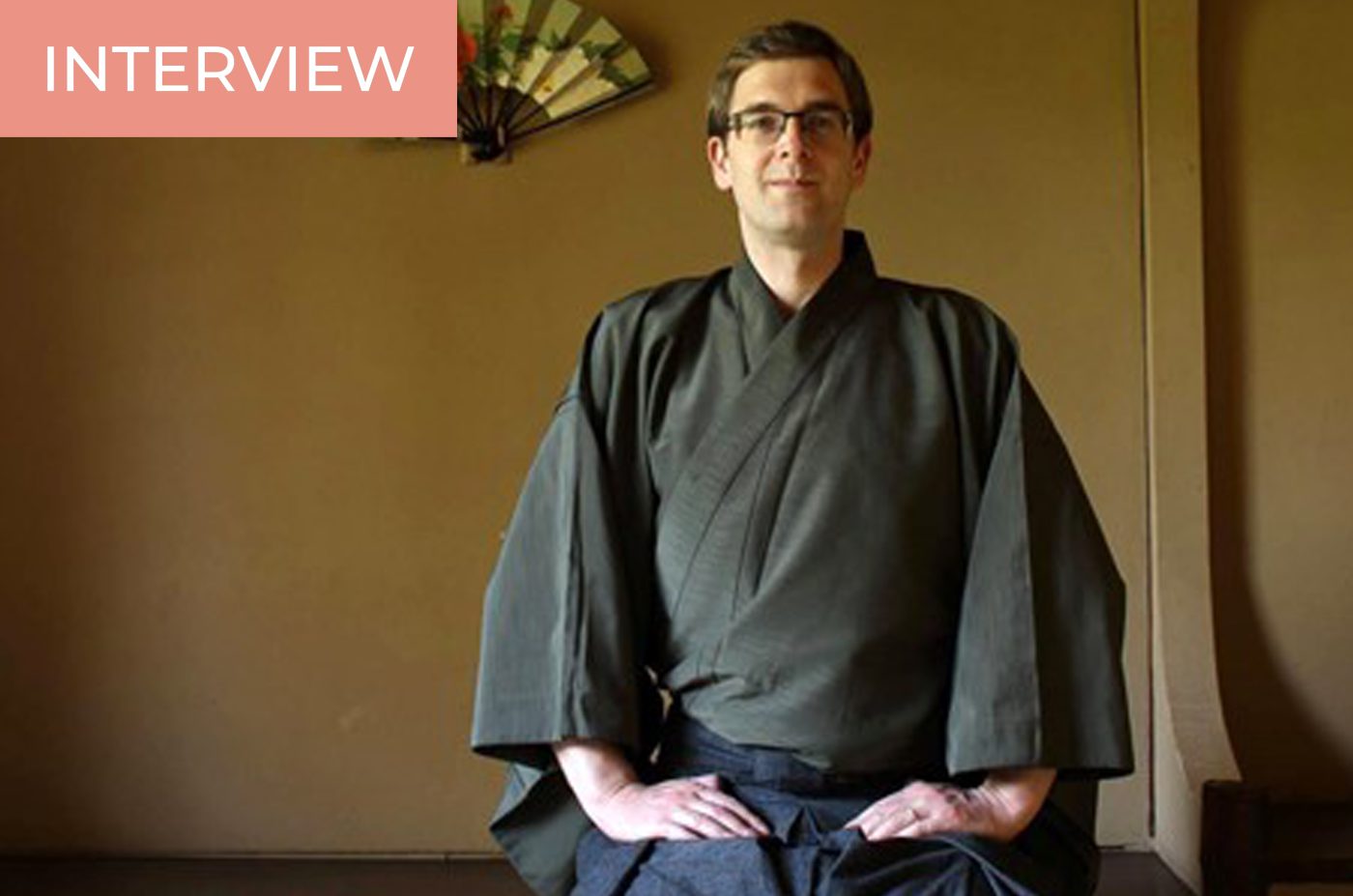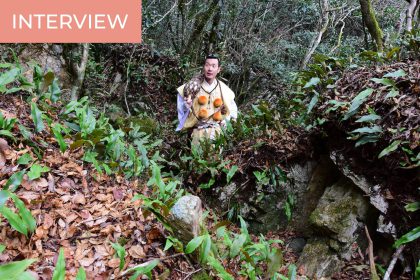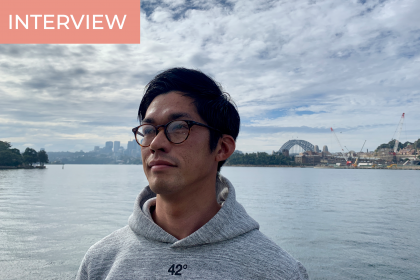The traditional inn—the ryokan—is where Japan’s rich history intersects with the unparalleled hospitality and customer service that the country is known for. Steeped in tradition, it’s hard to imagine what it would be like to work at a ryokan as a foreign resident of Japan.
Thankfully, Gary Luscombe, who works at Amami Onsen Nanten-en, has been sharing that very experience through his writing and social media content. Captivated by the images and stories he shares, I couldn’t help but reach out to him to find out more—especially after I learned about the unconventional path that led him to Japan.
In this interview, find out how Gary leveraged his diverse experience to overcome the language and cultural barriers that arise when working for a traditional Japanese institution. His story is one of overcoming life’s obstacles by coming up with creative solutions. The conversation that follows is filled with insights about working in Japan, especially within the hospitality industry.
From Banking and Gaming in the UK to Hospitality in Japan
I wondered what I could do with my limited, mostly administrative skillset. The usual job websites weren’t much help because their listings were almost entirely teaching jobs.
You had a unique journey to Japan. Can you connect the dots for us?
I’m from Guernsey in the Channel Islands, and the main industry there is banking. Most people there end up working in accounting or finance after graduating from university. After a pretty miserable time at high school, I ended up leaving when I was around 17. Rather than go to university, I ended up going straight into private banking, which I did for six or seven years.
When I was about 24 years old, I had a nervous breakdown because of job-related stress. I think it kind of harkens back to my unhappy school days. It was like 10 years of stress just exploded in one go. For about a year, I was unable to work. I was barely able to get off the sofa. I didn’t want to spend the rest of my life like that. I knew I had to get out of the house and start looking for work.
Coincidently, a friend from high school called me out of the blue and asked me if I wanted to do some testing work for a video game studio called Bizarre Creations. What was supposed to be a two-week contract turned into a rolling monthly contract. Although we worked on two great games, the market was competitive at that time, and eventually, the studio was closed down. When that happened, a few of us moved to Cambridge to work for Jagex, the studio behind RuneScape.
Although I loved working in the industry, the risk of losing my job every couple of years wasn’t for me. By then, I’d already met my partner, and she was living in Japan. So, we decided it was as good a time as any for me to move there.
Because I love history almost as much as the owner does, he could relate to me, and he gave his blessing for me to start working at the ryokan.
Like many foreign residents, when you first arrived in Japan, you struggled to find work. What specific challenges did you face, and how did you overcome them?
I came to Japan with little knowledge of Japanese. The one thing I knew I didn’t want to do—or couldn’t do—was teaching English. Even though I’m a writer, explaining the language is difficult for me. So, I had no skill and, more importantly, no passion for teaching.
I wondered what I could do with my limited, mostly administrative skillset. The usual job websites weren’t much help because their listings were almost entirely teaching jobs. So, I went to Hello Work [a government-run employment service center]. The branch in Umeda [Osaka] had English-speaking staff to help with the incredibly complicated job database. Eventually, we found a front desk position for a ryokan in a village that was only 10 minutes away from my house. The job posting didn’t say anything about language abilities, but we presumed you needed to be a native Japanese speaker. However, the Hello Work employee was willing to give them a call and explain my situation. So, she phoned the ryokan up and said, “Look, I’ve got this English guy. He doesn’t speak very much Japanese. He’s a writer and has an Instagram account with a few hundred followers. He’s done a little bit of tourism work. What do you think about having a chat with him?”
They replied, “Actually, we do have a lot of foreign guests. So, send him over, we’ll have a chat, and we’ll see how it goes from there.”
My first meeting was with the general manager. She didn’t think I’d be very useful for Japanese guests at the front desk, but she thought I’d be able to deal with all the foreign-language communication and welcome all the foreign guests. I could handle English-language social media as well. Even though there was a considerable amount of work that I couldn’t do because of my language ability, she was progressive enough to think that I had potential and figured I could pick up the Japanese side of things as I went.
A few weeks later they called me back to meet the owner of the ryokan. It turned out that we are both history nerds, and we connected over Kusunoki Masashige, a 14th-century samurai master. Because I love history almost as much as the owner does, he could relate to me, and he gave his blessing for me to start working at the ryokan.
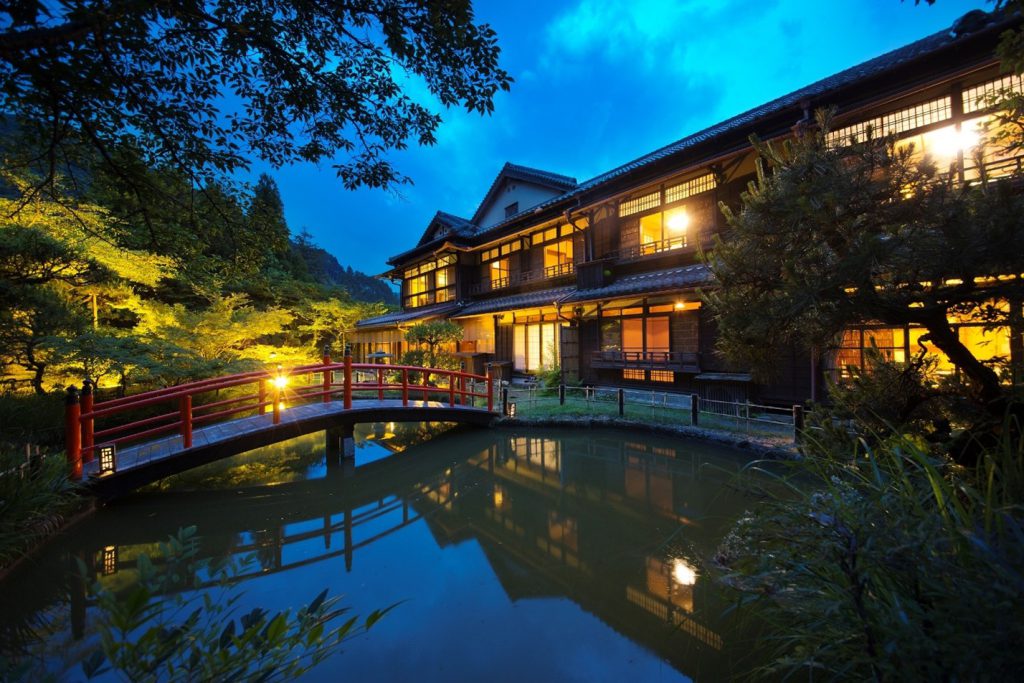
You mentioned writing and social media, and that leads to my next question. I can see how your passion for history played a role in your employment, but could you tell us more about your writing and the role that it played?
Writing was something I’d always had an interest in, but I’d never really planned to do it. When you’re working almost 20 hours a day in the video game industry, you don’t have time for that kind of thing.
I was living in Japan for nearly two years before I started working at Nanten-en. To make a little bit of money to keep myself going, I started doing some freelance writing about local places. There weren’t a lot of people writing about Kawachinagano. There is so much cool, interesting history around here that no one had ever heard of. I decided to pick out locations, write about them, and pitch articles to whoever was interested in taking them. Most of my work was picked up by one website. They started me off in the writing world, and my editor was supportive, giving me great feedback on how to improve my articles.
Would you say that your ability to write, combined with your passion for history, gave you the edge in getting hired at Nanten-en?
Absolutely. I think they had a Facebook page at the time that was only in Japanese and was only updated once every four or five months. So, I think they were excited to have a staff member who could promote the ryokan, ryokan culture, and Japanese culture as well.
Overcoming Obstacles by Going Above and Beyond
I still face obstacles every day.
Let’s talk about your experience working for a traditional ryokan. You mentioned that you didn’t know Japanese when you were hired. Did this create obstacles at work?
I still face obstacles every day. Even though I’ve been studying for five years, my brain just isn’t wired for learning Japanese. I still don’t even consider myself conversational. I’m kind of conversational in ryokan terms, though. There’s a certain language that you pick up for welcoming guests, introducing them to rooms, and things like that. Sometimes, when the owner or general manager speaks to me, I think I’ve understood everything that they’ve said, but then I realize that I got the context wrong. So, I’ll end up doing the opposite of what they’ve asked. That ended up being a problem and I would get the telling off that I deserve. However, since two or three of my colleagues can speak English, there’s always someone around who can help with difficult circumstances.
What are you doing to overcome these challenges?
I’m constantly trying to learn the language better because I need it outside of work as well. Also, while I’m not so useful at the front desk, I don’t want to waste time and space sitting in the office doing nothing. So, when the pandemic began, I stepped away from the front desk and started helping the cleaning staff. I also started helping in the kitchen.
Eventually, I started fulfilling the role of a hosa, an assistant to the nakai—the kimono-wearing staff who serve traditional meals. They took me under their wings and showed me exactly what I needed to do. The way kaiseki [traditional Japanese cuisine] works is actually incredibly complicated.
One thing I’ve noticed during my time in Japan, certainly at the ryokan, is that people tend to work in silos.
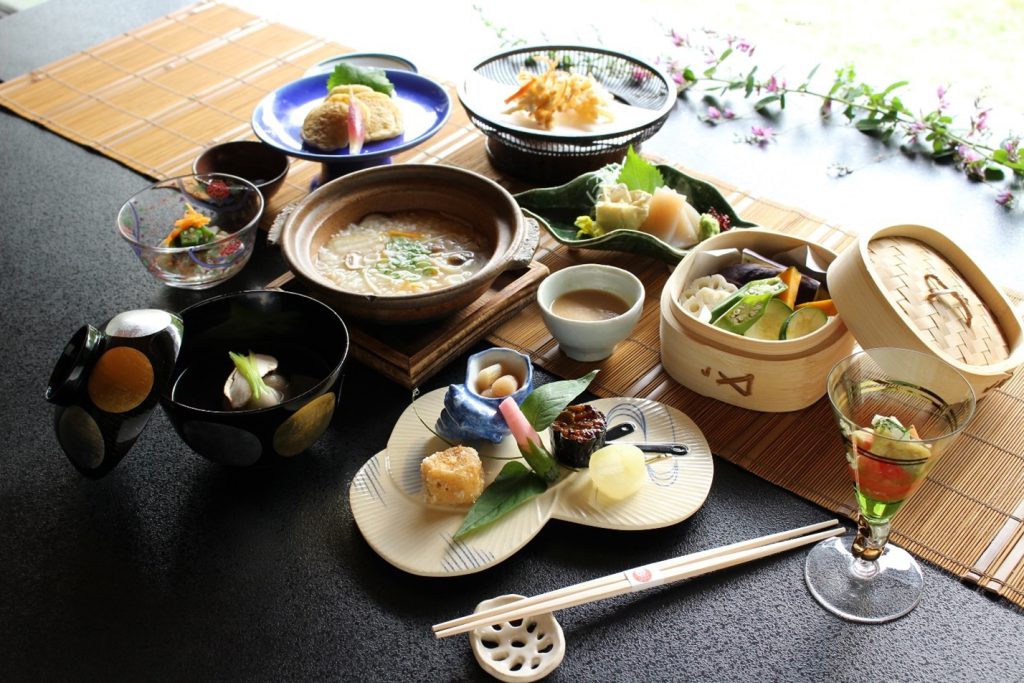
Are you saying that one way that you overcome difficulties is by making yourself useful in other aspects of the business?
Absolutely. One thing I’ve noticed during my time in Japan, certainly at the ryokan, is that people tend to work in silos. If you’re at the front desk, then you only work there, and you shouldn’t do anything for any other teams. If you’re a cleaner, you should only do the cleaning. There isn’t very much crossover in between the different teams.
Since I’ve had different roles throughout my life, I think that I’m adaptable. Maybe I can’t pick up a language quickly, but I can pick up the mechanics of certain things relatively quickly through observation. By making myself useful and helping out where I can, people can see that I have some potential. People know that on a busy day, I’m not going to stay at the front desk doing nothing. I’m going to help with other roles. I’m currently the only staff member that will do up to three roles in one day.
Meeting High Customer Service Standards
I’ve also been watching the general manager very closely because she deals with VIP guests. Most foreigners don’t realize how much knowledge about everything the general manager needs to have.
I’m often impressed when I travel in Japan and see a foreign resident in a customer-facing role in the hospitality industry. I know how high Japanese service standards are, and it must be a challenge to meet them. How did you learn to meet these standards?
I’ve picked up the formal things by watching and listening to the other front desk staff. They’ve been explaining the way things work and what I should say when guests arrive, when I’m showing them to their rooms, and so on.
I’ve also been watching the general manager very closely because she deals with VIP guests. Most foreigners don’t realize how much knowledge about everything the general manager needs to have. She has to know how to serve kaiseki and welcoming etiquette. She has to know the entire history of the building and the details of all of the hanging scrolls in each room. She has to know all of the flowers in the garden and when they will bloom.
I’ve been learning some tea ceremony etiquette and aspects of ikebana. I can incorporate that into my interactions with guests.
I’m trying to learn the way she does things so that I can do something similar for foreign guests. It’s an aspect of staying at a ryokan that they might not otherwise get to appreciate.
The owner has also been an extremely important person for me to learn from because he’s an Omotesenke tea master and ikebana [traditional flower arrangement] master. So, I’ve been learning some tea ceremony etiquette and aspects of ikebana. I can incorporate that into my interactions with guests.
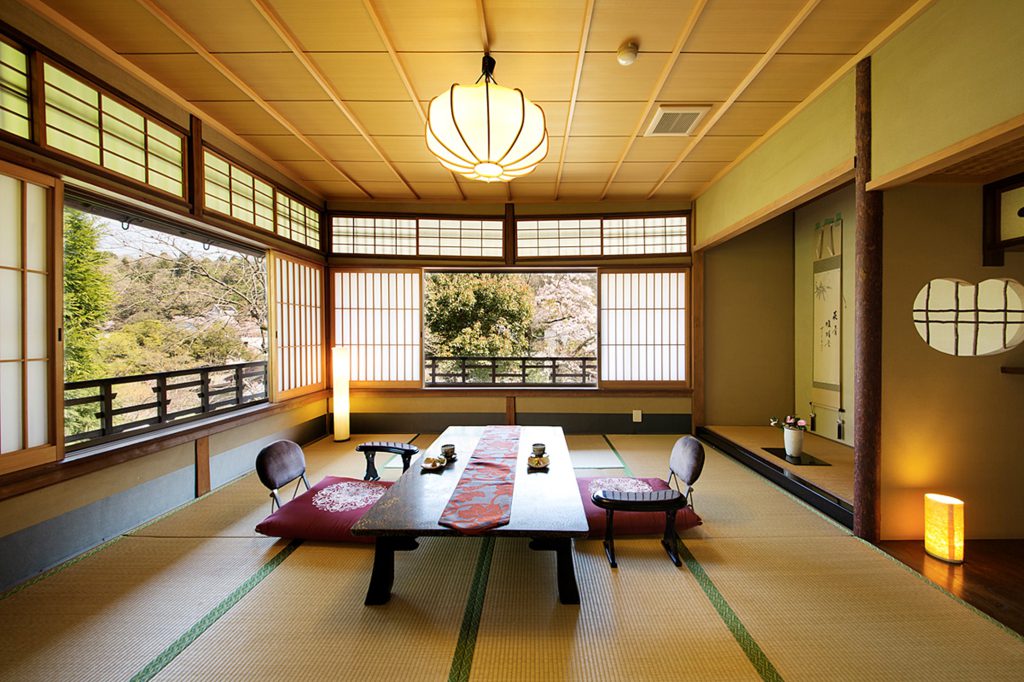
So as long as someone is willing to mentor you, you’re confident that you can replicate what you learn. Is that what enables you to provide a high standard of service?
Exactly. However, I do get a little leeway as a foreigner, especially—and surprisingly—with Japanese guests. For example, when I’m serving lunch, the atmosphere might be a little stuffy. I usually know when Japanese guests want to ask me something—perhaps something about where I’m from. So, I will deliberately make a small, unoffensive mistake—placing a dish in a slightly different location, for example. This gives me a chance to say something like, “Oh, I’m sorry. I didn’t do that quite right. Japanese cuisine can be complicated. English cuisine is simple.”
This silly interaction relaxes the room, and prompts the guest to say, “So, you’re from England…” Then, we’ll end up having an entire conversation. This creates a more enjoyable experience for all of us. If I were a Japanese staff member, there’s no way I could get away with this. But because I’m an English guy, I have a little leeway, which can change the whole atmosphere of the room.
Final Thoughts: Off the Beaten Path
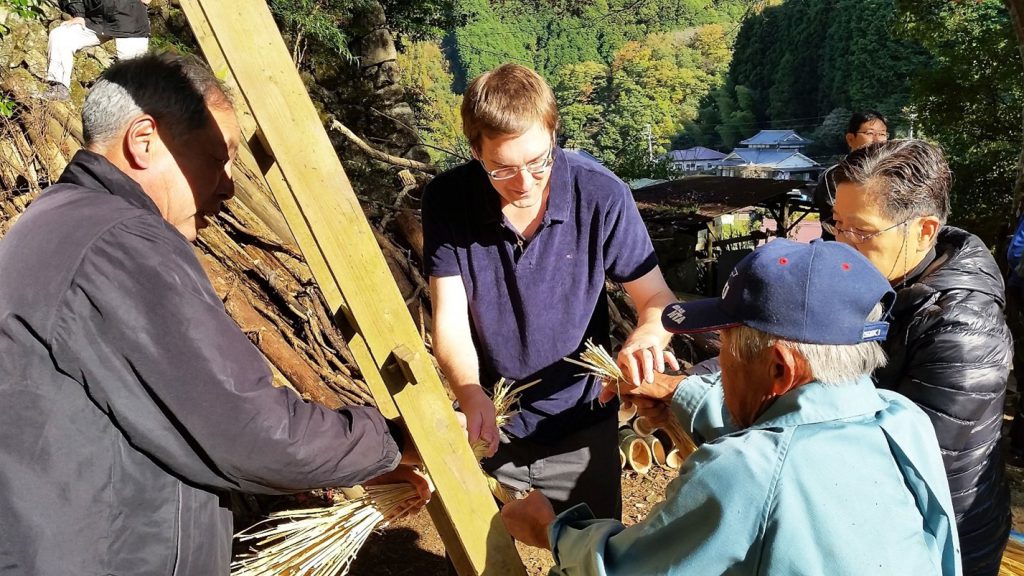
You’ll pick up the necessary phrases and etiquette on the job anyway. So, if you’re a resident in Japan, don’t be afraid to go to Hello Work,
Once the tourism boom returns, I believe that we’re going to see more foreign workers in the hospitality industry, especially considering Japan’s labor shortage. Given your experience, what advice do you have for foreign residents who want to work in the Japanese hospitality industry?
Most of all, you should at least know conversational Japanese. This means I’m not the best example of how to break into this industry. It’s been serendipitous for me. I’m lucky that I fell into the industry by accident. Not knowing Japanese just makes the experience more difficult than it needs to be. Given that most of your customers and colleagues will be Japanese, you need an easy way to communicate with them.
That being said, most job listings might include business- or native-level Japanese as a requirement. However, I don’t think that’s necessary. It’s worth taking a shot at these jobs, even if you don’t feel like your Japanese ability is at that level. You’ll pick up the necessary phrases and etiquette on the job anyway. This makes it difficult if you’re applying via websites, because you don’t have a chance to explain yourself. So, if you’re a resident in Japan, don’t be afraid to go to Hello Work—the job center. They have thousands of jobs that aren’t listed on websites. Plus, they have helpful staff on hand that can call up an employer directly. The job center doesn’t get lauded enough as it should as a resource for foreigners seeking employment in Japan.
Is there anything else that you’d like to share with our readers?
Just one thing—more about ryokans than about myself. When staying at a ryokan, I’d like to encourage people to explore the surrounding countryside. Arrive in the area early or stay a little later. Go for walks, and you’ll be amazed by what you can find nearby.

